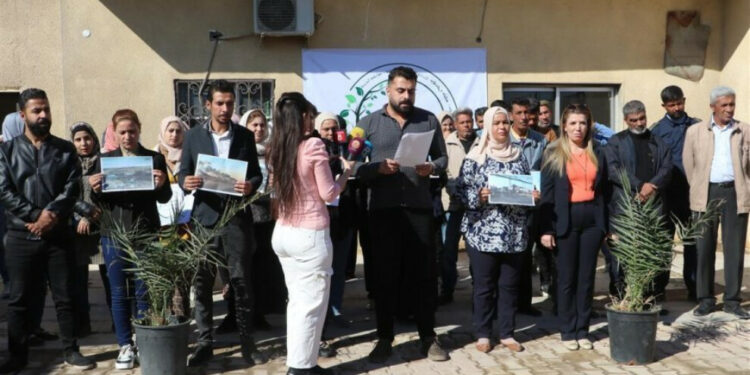Escalating Assaults: Analyzing Recent Turkish Aggressions in North and East Syria
The Turkish government continues its aggressive military operations in North and East Syria, with a focus on civilian populations and essential infrastructure. The recent bombardments, which encompass airstrikes from warplanes, drone assaults, and artillery shelling, have unfortunately targeted vital establishments such as healthcare facilities, educational institutions, bakeries, grain storage sites, wheat silos, power generation plants, businesses as well as communication networks like telephone services; additionally affecting water supply systems along with gas and fuel stations.
Civilians Suffer: The Aftermath of the Latest Attacks
The wave of violence that began on the evening of October 23 has resulted in numerous civilian casualties. Ziyad Rustem—Co-Chair of the Energy Board within the Democratic Autonomous Administration for Northern and Eastern Syria—reported that approximately 120 thousand individuals are now without access to both water and electricity due to strikes on power plants located in Amûdê, Tirbespiyê, and Kobanê. Furthermore, he mentioned that damages inflicted thus far on critical service installations total an alarming 5 million dollars.
Environmental Degradation Due to Military Actions
In addition to direct attacks on civilians’ livelihoods, hostilities have also severely impacted oil production sites along with separation facilities—a move leading to significant ecological destruction within the region. Recent statements were made by members of Cizîr Canton’s Ecology Board outside their headquarters situated in Hesekê city. During this gathering led by Co-Chair Mihemed Ehmê alongside other board members highlighted concerning environmental implications.
A Historical Context: Lessons from Afrin
Ehmê referenced past aggressions observed during military operations in Afrin where systematic destruction manifested through practices such as tree cutting and burning alongside rampant unauthorized well drilling activities across regions like Sêrêkaniyê and Girê Spî. He emphasized how these enduring actions have set a precedent for current adversities faced due against ecological stability.
The Long-term Risks Posed by Military Activity
Stressing the immediate danger that recent assaults pose not just to human lives but also the very existence of local communities overall; Ehmê called upon international stakeholders including regional governments alongside human rights organizations—as well as groups dedicated specifically towards ecological preservation—to meticulously observe these hostile movements undertaken by Turkey’s occupying forces while classifying them rightfully under serious terminology such as war crimes or crimes against humanity followed further categorically under environmental violations.










